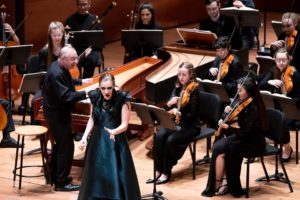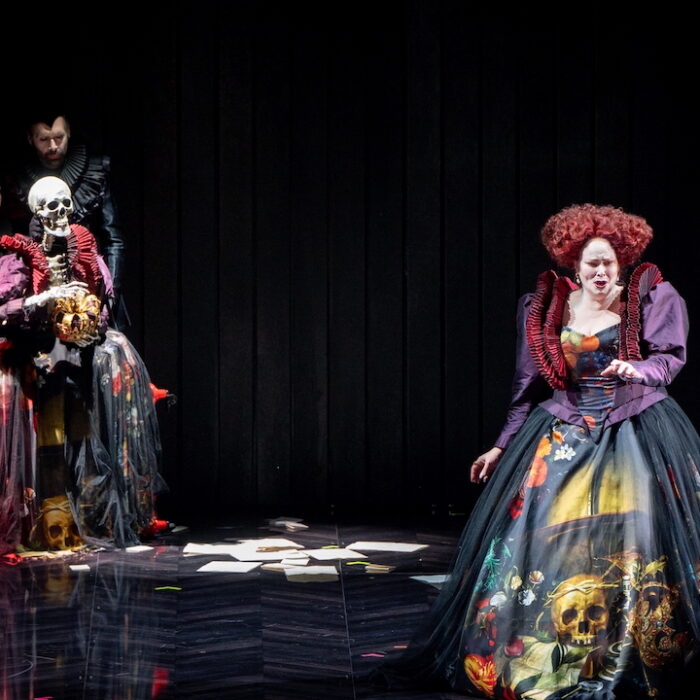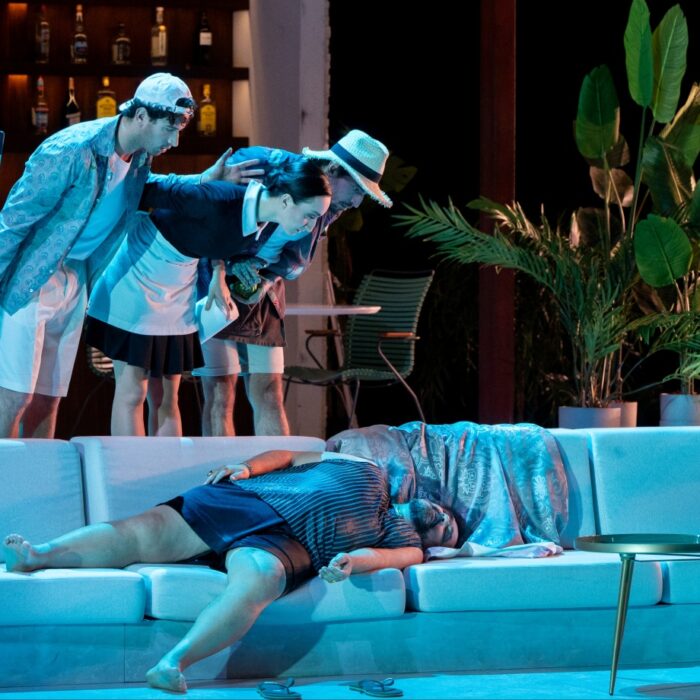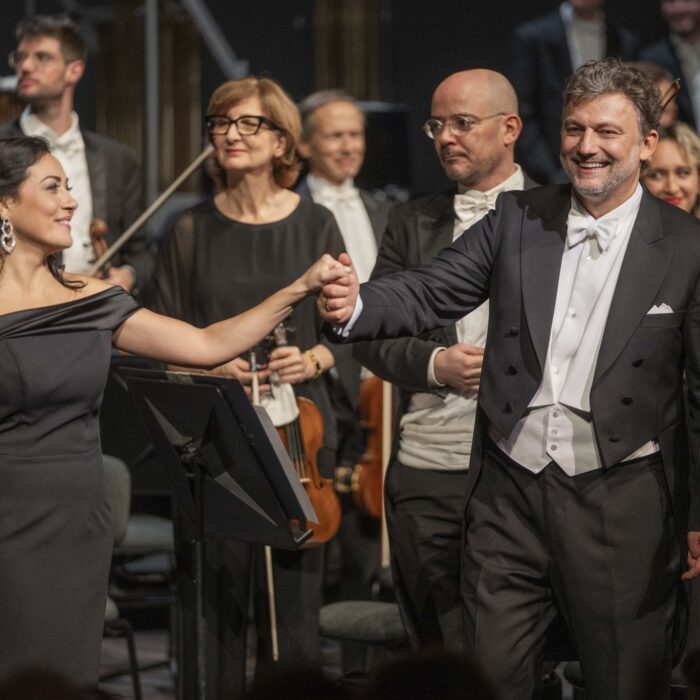
The Juilliard School 2019-20 Review: Rinaldo
Hyoyoung Kim, Erik van Heyningen & Jessica Niles Shine in Formidable Performance at Alice Tully Hall
By Arya Roshanian(Credit: Claudio Papapietro)
It’s been a great month for Handel fans in New York City.
Earlier this February, the Metropolitan Opera premiered Handel’s 1709 opera “Agrippina” for the first time (ever!) in a new production by David McVicar. And just a few weeks later, The Juilliard School presented another early Handel piece – his 1711 opera “Rinaldo,” just across the street at Alice Tully Hall.
“Rinaldo” follows the usual Handelian plot formula. Set in the midst of the First Crusade, Rinaldo, a knight, serves in the legion under Goffredo’s command. Rinaldo is in love with Goffredo’s daughter, Almirena – and much to their delight, Goffredo blesses the two to marry.
The leader of the opposing army Argante, however, vows to deter Goffredo’s army by separating Rinaldo from the troops. He summons the sorceress Armida to carry out the plan, ultimately using her powers to abduct Almirena. Rinaldo leaves his post to rescue her, thus achieving Argante’s goal. After a series of hijinks and who’s-whos, the two lovers are reunited. Argante and Armida repent and convert to Christianity. All ends positively and happily ever after.
Entering Handel’s World
The project was part of the annual collaboration between Juilliard Opera and Juilliard415, the school’s early music ensemble. In previous years they’ve offered gems like “Hippolyte et Arice” and “La Calisto,” operas seldom seen or heard in New York.
Given that baroque music thrives in smaller, more intimate venues, it’s also rare to hear composers like Handel, Bach or Rameau at Lincoln Center (at least outside of the holiday season). Efforts are being made to change that, with rumored Handel premieres scheduled for future seasons. And as wonderful as “The Messiah” is, it’s always a treat to experience more variety in Handel’s catalogue.
But “Rinaldo” has already enjoyed success in New York City. The Met first staged it in 1984 with mezzo-soprano Marilyn Horne in the title role. This production marked a shift for the Met – not only did it offer a long overdue debut for the prolific composer, but also proved that Baroque opera, when appropriate cast and conducted, can thrive in a bigger house.
Likewise, “Rinaldo” was most recently seen at Carnegie Hall in 2018. Another big house, and reviews were again favorable. So as long as you have a conductor who knows what he’s doing and cast singers that suit the music well, why not present an intimate period ensemble in a 3,800-seat house?
To the delight of Baroque purists, however, Juilliard’s “Rinaldo” was appropriately performed in Alice Tully Hall. At just over 1,000 seats, it’s the ideal space for opera of this era. Significant cuts were made to the score, presumably to make the performance more compatible for 21st-century attention spans. Capped at around two hours and a half hours, it felt more like the greatest hits than the complete show.
Maestro and early music specialist Nicholas McGegan led the performance with an infectiously joyous demeanor. Among his many proclivities is his ability to not only give life to the score, but also his surroundings. He communicated with the musicians with a jovial stare, often turning around to give the audience the same courtesy. For a brief time we were allowed into his world, experiencing “Rinaldo” through an optimist’s lens.
With minimal direction offered by Ophelie Wolf, it was also more semi-staged than a “concert version” like it was billed. With most of the staging eliminated, the singers could focus on communicating the story through the music. And that they did.
Major Up and Comers
Juilliard produces some of the finest up-and-coming musicians today, and the cast of “Rinaldo” was no exception.
The title role was sung by Swedish mezzo-soprano Karin Osbeck, who navigated Rinaldo’s music with care and diligence. But perhaps she started out a little too carefully. Osbeck sang her first aria “Ogni indugio d’un amante” with solid technique, but there wasn’t much diversity in vocal color or dramatic expression. Her “Cara sposa” later in Act one was also sung a little too briskly, but that may have been a decision from the Maestro. But maybe she needed time to settle into her voice. It wasn’t until the second half where Osbeck shined, her lithe mezzo sound exposing its full potential in the aria “Abbrugio, avampo e fremo.” Overall, it was a fine interpretation.
Among the vocal standouts were bass-baritone Erik van Heyningen and soprano Jessica Niles as Argante and Armida, respectively. Van Heyningen hit a home run right off the bat with his first aria “Sibillar gli angui d’Aletto,” complete with a quartet of trumpets. It received one of the biggest ovations of the evening. His dusky voice moves well, and had no problem executing the punishing coloratura demanded of the score. Though the staging was sparse, he gave an equally captivating effort dramatically. He certainly has a career in this repertoire.
It’s important to remember that though these are pupils at the top of their pack, they are still students. Niles showed much promise with her crystalline soprano, which cut through the hall like a laser. A first-year master’s student, Niles is still young, but that didn’t make her performance any less captivating. She held nothing back with Armida’s first arioso “Furie Terribili,” summoned by Argante to use her magic to separate Rinaldo from Goffredo’s army. In a series of intricate melismas, Niles took Handel’s music by the horns. She gave another valiant effort in her later aria “Molto voglio, molto spero,” her voice again piercing the air at the top of her register.
Just as awe-inspiring was her Act II aria “Vo’ far guerra, e vincer voglio,” in which Armida swears off Argante and ceases the operation. The aria is really a duet between soprano and harpsichord. Jacob Dassa, a graduate student of Juilliard’s Historical Performance program, brought the house down with the complicated harpsichord solos. The conclusion of the aria was met with deafening applause for both Niles and Dassa.
As Almirena, Korean soprano Hyoyoung Kim was the most ready for primetime. Her sweet timbre is as graceful and poised as she is, which was showcased no better than in her Act I aria “Augelletti, che cantate.” Kim can do a lot with her voice – clean trills, sustained pianissimi above the staff, both of which throughout the evening. And like “Vo’ far guerra,” this aria is like a duet – this time with the recorder. Mimicking the chirps of birds in her garden as Almirena waits for Rinaldo, Kelsey Burnham eased through the complex labyrinth of notes. The audience ate it up.
Two undergraduate students were featured in smaller roles, but made equally engaging impressions. Senior Maggie Renée Valdman, in the generously cut-down version of Goffredo, possesses a luscious and deep mezzo sound suited well for the music. Her interpretation was earnest and wise, commanding the stature of an army general. Sophomore Song Hee Lee was a delightful Donna, making the most of her scenes with a seductive and cunning demeanor.
If Maestro McGegan’s goal was to transmit his ardor for Handel’s music through osmosis, it worked. It’s a shame we only got a taste for one night.


